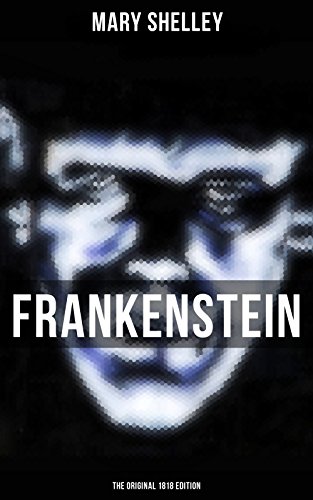-
Frankenstein
Mary Shelley, Sylvia Hunt
Paperback (Universitas Press, July 1, 2016)Frankenstein is, arguably, one of the most iconic novels in English literature. With its powerful, unsettling plot, isolated characters, and the wretched Creature at its center, it has become part of the Western cultural fabric. Mary Shelley reminds us that the error of the scientist can only have dreadful consequences if the rest of society proves to be irresponsible. Frankenstein's one sin is a sin of omission, rather than a sin of commission: he fails to accept the responsibilities of his creativity, and for this he is fearfully punished. But the real villain of the work is all mankind, the social animal that blindly abuses his tools. Frankenstein is read today in two slightly different versions: the first edition of 1818, written by a very young Mary Shelley; and the edition of 1831, in which irreversible fate is more powerful than human free will. Other, minor, differences between the two texts originate in yet another version of 1823. In the present edition, we have preferred the 1818 original text, more useful for the student of British Romanticism, but we have incorporated all those corrections from 1823 that the novelist chose to preserve in 1831, in the hope of doing justice to the young Mary Shelley, without entirely disregarding the wishes of the mature author.
-
Frankenstein
Shelley / Hatt
Audio CD (FREMEAUX, Jan. 10, 2020)Passionné par les sciences occultes, Victor Frankenstein est persuadé qu’il peut donner la vie. Dans la solitude de son laboratoire, un soir d’orage, son rêve devient réalité... et tourne au cauchemar. Il vient de créer un être monstrueux. Victor fuit, épouvanté. Mais il est trop tard : la créature, rejetée de tous, prépare déjà sa vengeance... La subtile lecture de François Hatt vient plonger l’auditeur au coeur de ce chef-d’oeuvre intemporel, à la croisée de l’horrifique et du philosophique. Ce mythe du Prométhée moderne, écrit en trois jours par la jeune Mary Shelley, a bouleversé la littérature, et il continue d’exalter l’imagination. Lola CAUL-FUTY FRÉMEAUX DIRECTION ARTISTIQUE : MYRIAM GILLES 8 H 10 MIN
-
Frankenstein: by Mary Shelley
Mary Shelley
Paperback (Independently published, Nov. 11, 2019)A monster created by a mad scientist, the original tale of Frankenstein by Mary Shelley.
-
Frankenstein
Mary Shelley
Paperback (CreateSpace Independent Publishing Platform, Dec. 13, 2016)Mary Shelley was a prominent English author in the eighteenth century. Shelley was the wife of the Romantic poet Percy Bysshe Shelley but she is now best remembered for writing Frankenstein, one of the most widely read novels in all of literature. Frankenstein, published in 1818, is a classic in the Gothic and horror genres of fiction. The book tells the story of a young scientist who creates a monstrous creature after conducting an unorthodox experiment. Frankenstein has been made into countless movies, plays, and television series over the years.
-
Frankenstein: The Modern Prometheus
Mary Wollstonecraft Shelley, Dick Hill, Alpha DVD
Audiobook (Alpha DVD, Sept. 17, 2008)Frankenstein, written by British author Mary Wollstonecraft Shelley, was first published in London in 1818. Victor Frankenstein learns how to create life and creates a being in the likeness of man, but larger and more powerful than the average man. Frankenstein rejects the creature, and lives to regret his desire to create life, after it kills his brother William. Frankenstein is a warning against the "over-reaching" of modern man and the Industrial Revolution - as alluded to in the novel's subtitle, The Modern Prometheus. Frankenstein has significantly influenced modern literature and popular culture, and spawned the "mad-scientist" genre of horror stories and films.
-
Frankenstein
Author
Misc. SuppliesNone
-
FRANKENSTEIN
Mary Shelley
eBook (Musaicum Books, Dec. 6, 2017)Frankenstein; or, The Modern Prometheus is a novel written by Mary Shelley about a creature produced by an unorthodox scientific experiment. Shelley started writing the story when she was nineteen, and the novel was published when she was twenty-one. The first edition was published anonymously in London in 1818. Shelley's name appears on the second edition, published in France in 1823. The original 1818 'Uncensored' Edition of Frankenstein as first published anonymously in 1818. This original version is much more true to the spirit of the author's original intentions than the heavily revised 1831 edition, edited by Shelley, in part, because of pressure to make the story more conservative. Many scholars prefer the 1818 text to the more common 1831 edition.Mary Wollstonecraft Shelley (1797–1851) was an English novelist, short story writer, dramatist, essayist, biographer, and travel writer, best known for her Gothic novel Frankenstein: or, The Modern Prometheus.
-
Frankenstein
Mary Wollstonecraft Shelley, D. Cok
eBook (Green Reader Publishing, Dec. 28, 2015)Frankenstein; or, The Modern Prometheus is a novel written by the English author Mary Wollstonecraft Shelley that tells the story of a young science student Victor Frankenstein, who creates a grotesque but sentient creature in an unorthodox scientific experiment. Shelley started writing the story when she was 18, and the first edition of the novel was published anonymously in London in 1818, when she was 20. Shelley's name first appeared on the second edition, published in France in 1823.
-
Frankenstein
Mary Shelley
Mass Market Paperback (New American Library, Aug. 16, 1983)None
-
FRANKENSTEIN
MARY SHELLEY, COVER
Board book (WORDSWORTH EDITIONS LIMITED, July 5, 1993)None
-
Frankenstein or the Modern Prometheus
Mary Shelley
Hardcover (Simon & Brown, Nov. 20, 2018)None Z+
Z+
-
Frankenstein by Mary Shelley
Mary Shelley
Mass Market Paperback (Tor Classics, Aug. 16, 1760)None